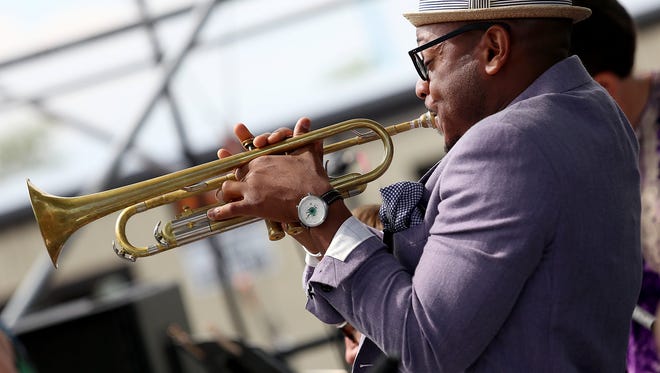Duante Beddingfield - Detroit Free Press
Charles was born into a musical family.
“My father played in a steel band and was a DJ,” he said, “and my mother came from a musical family and played records all the time. So there was always music in the house, all different styles. When I was about 4 years old, I started singing in a choir. I got a trumpet when I was 10 and played a little steel pan, a little percussion.”
Educations at the Berklee College of Music, Florida State University, and the Juilliard School of Music bolstered Charles’ talent and his understanding of musical roots. He studied with Tiger Okoshi and Marcus Roberts, and went on to perform and record with the likes of Wynton Marsalis, Maria Schneider, Roberta Flack, the Count Basie Orchestra, Monty Alexander, Wycliffe Gordon and others.
The sounds and rhythms of his youth and heritage stayed with him even as he became a rising star on the American jazz scene. He began to blend those pan-Caribbean sensibilities, the boisterous brass flavors of New Orleans that benefited so richly from them in the early 20th century, and the sophisticated swing of New York straight-ahead to form a flavorful blend that has won raves from critics.
“It’s really about musically unifying the African diaspora without misunderstanding that there are many roads to take to get back to the continent," he said. "There are so many different facets of musical expression, cultural expression, that enriched my understanding, and I try to bring those elements together.
“It’s like how I was born and raised in Trinidad, but I have cousins who were born and raised in New York, who grew up in Florida, the U.K., in Canada. Even though we speak different dialects of the English language, we have the same blood, and when we get together, we have a common trait we share. I think it’s the same with the music of the pan-African diaspora. So Creole Soul is really about moving around the dial so you get a taste of what it’s like to be in the Caribbean, to be in the Deep South, Haiti, Trinidad, Tobago, Martinique, Detroit, New York – specifically, all of the Black towns and countries that have contributed to the music we all share.”


Replies
Yes Claude! hahaha! we are acquainted musically. I know of some people who might be blowing steam out of their ears after reading that article....lol, but they are not pan musicians like us, so they most likely, will not be on this beautiful web site.
Please don't press me for more information. I might loose my Job.
I know that there's 2 sides to every story....Don't forget your roots man....I understand that it's the Detroit press, and not the Trinidad Express. nuff said.
You write that,Carlyle. Is only out of curiosity to your response that I decided to open this posting.
But if you write that "Don't forget your roots man" then you have a friend for life.
I sure hope that I did not misunderstand you ... but we might very well be on the same page!!!
I chose not to read the article ... so maybe I went down the wrong road here ... but I am GUESSING that we might just be on the same page ... doh tell me that YUH IS AH REAL TRINIDADIAN!!!